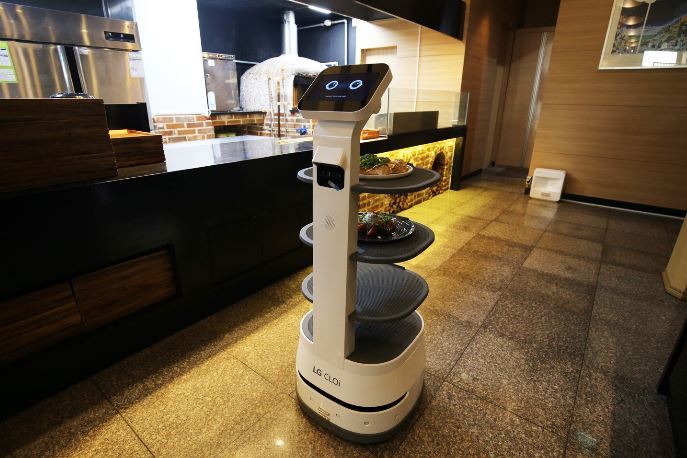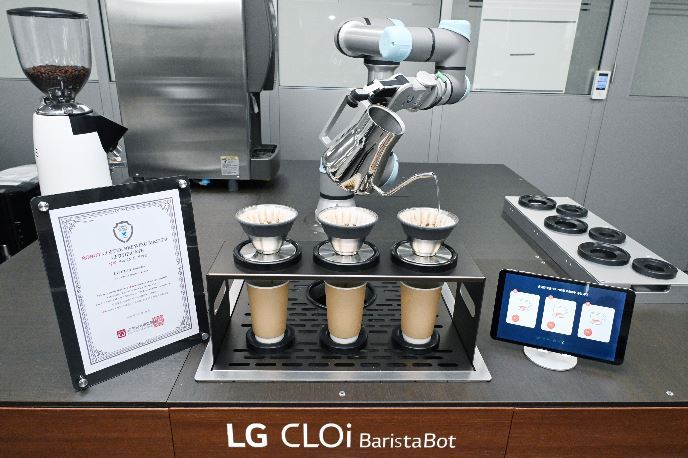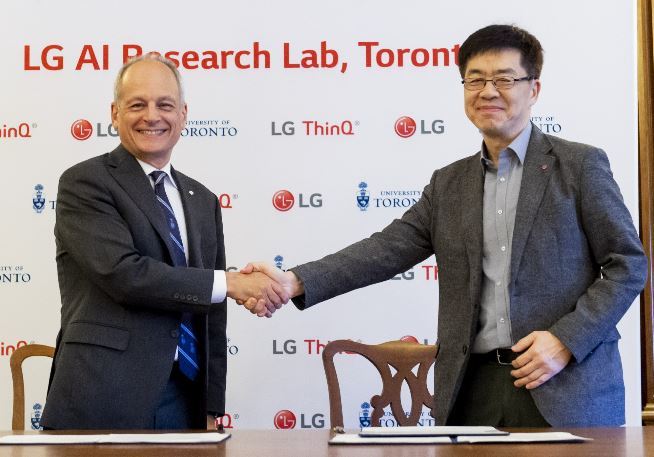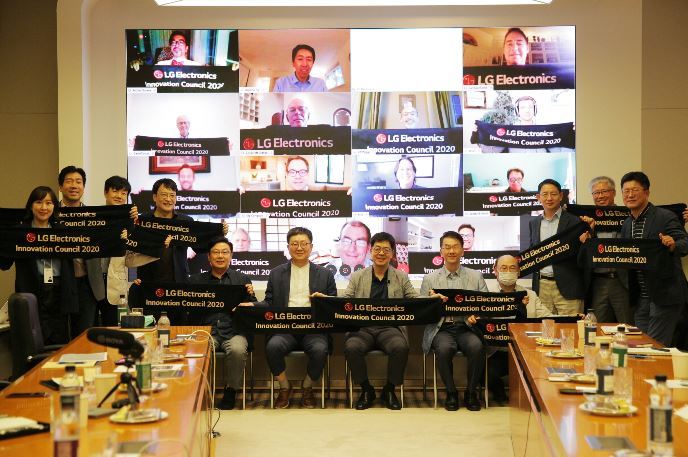 |
LG Electronics' CLOi ServeBot (LG Electronics) |
LG Electronics, a household name in home appliances, is preparing for the future of homes by investing in robotics and artificial intelligence technology.
The company, which has so far launched more than 10 kinds of robots, is seeking more innovation opportunities with global partners and experts to raise competitiveness in the field.
CLOi robots
At the 2021 CES, LG Electronics garnered attention with its CLOi UV-C robot, which can move around and sanitize indoor spaces with ultraviolet light.
When launched, the CLOi UV-C robot will be LG’s first robot to be rolled out in the United States.
The disinfection machine is, however, just one of an array of robotic solutions that the company has introduced over the past few years.
Last year, LG Electronics commercialized several assistive robots that can be used in public spaces, including restaurants, hospitals and convenience stores.
In July LG Electronics supplied its first autonomous driving robot to Seoul National University Hospital -- the first time a commercial assistive robot was introduced to a local hospital.
Deployed to the outpatient unit, the CLOi ServeBot assists hospital staff by delivering treatment kits, medical devices and other necessities.
Another LG Electronics robot, which features three drawers that can hold up to 15 kilograms, made its way into LG Science Park in Seoul last year.
The self-driving delivery robot navigates its way through the nine-floor building, using elevators, to deliver parcels. It was the first robot in the country to receive the Ministry of the Interior and Safety’s approval to travel via elevators.
The CLOi BaristaBot holds the title of the country’s first certified robotic coffee master, with a license from the Korea Coffee Association. The product started working Friday at LG Twin Tower in Yeouido, Seoul.
LG plans to deploy the robots at major LG Best Shop branches starting this year, the company said.
 |
LG Electronics’ CLOi BaristaBot (LG Electronics) |
Spending for more
LG Electronics’ recent launches of robot assistants is backed by the company’s research efforts since 2017, the year the company introduced its first commercial robot lineup.
Since 2017, the South Korean tech giant has increased its partnerships with overseas research institutions, while increasing the number of in-house labs dedicated to the company’s AI and robot capabilities.
In January last year, LG Electronics announced it was collaborating with Massachusetts Institute of Technology professor Kim Sang-bae, a renowned robot scientist who has led the MIT Biomimetics Robotics Lab for a decade.
The company also established the LG Boston Robotics Lab to accelerate research into its robots’ ability to recognize and manipulate objects.
Also in 2017, LG Electronics established a research unit in Toronto, dedicated to developing AI technologies. The research areas of this institution include reinforcement learning, which allows AI to solve problems without human interference, as well as Edge AI, which enables AI to process data without having to connect to the cloud.
LG Electronics operates similar research centers in Korea, India and Russia.
In 2018 the company acquired robot manufacturer Robostar and AI startup Acryl. It also spent $3 million to buy a stake of about 5 percent in US-based Bossa Nova Robotics that year.
The 2019 appointment of Joseph Lim, a computer science professor at the University of Southern California, as the company’s executive member, was an unprecedented measure that epitomized the company’s efforts to secure talent.
To bring expertise into the company’s in-house labs, LG Electronics has taken other actions too.
In 2019, LG Electronics started a certificate program with the US Carnegie Mellon University and Canada’s University of Toronto to nurture artificial intelligence specialists.
 |
LG CTO Park Il-pyung (right) shakes hands with University of Toronto President Meric Gertler to mark launch of the LG AI Research Lab in 2018. |
In the same year, LG Electronics also joined Soft Bank Ventures Asia’s 341 billion won fund, primarily targeting investments in early-stage AI developers in the Asia-Pacific region.
During an online panel event held as part of the 2021 CES, LG Chief Technology Officer Park Il-pyung stressed that the company would seek open innovation opportunities with global partners.
“We simply can’t do everything ourselves because the world is just changing too fast,” Park said at LG Future Talk. “So, we have to work with others and innovate as a team,” Park added.
LG Electronics last year launched the Innovation Council to seek new ideas that would potentially open up new business opportunities.
 |
LG officials pose to celebrate launch of its Innovation Council, dedicated to discovering future technologies, in 2020. |
The council consists of 12 experts in fields including artificial intelligence, big data, cloud computing, robots and mobility.
The 12-member council includes Sri Shivananda, chief technology officer at Paypal; Adrian Cockcroft, vice president of cloud architecture strategy at Amazon Web Services; Kip Compton, senior vice president of Cisco’s cloud platform and solutions group; and renowned robot scientist Rodney Brooks, chief technology officer and founder of Robust.AI.
By Shim Woo-hyun (
ws@heraldcorp.com)









![[Exclusive] Hyundai Mobis eyes closer ties with BYD](http://res.heraldm.com/phpwas/restmb_idxmake.php?idx=644&simg=/content/image/2024/11/25/20241125050044_0.jpg)
![[Herald Interview] 'Trump will use tariffs as first line of defense for American manufacturing'](http://res.heraldm.com/phpwas/restmb_idxmake.php?idx=644&simg=/content/image/2024/11/26/20241126050017_0.jpg)
![[Herald Review] 'Gangnam B-Side' combines social realism with masterful suspense, performance](http://res.heraldm.com/phpwas/restmb_idxmake.php?idx=644&simg=/content/image/2024/11/25/20241125050072_0.jpg)